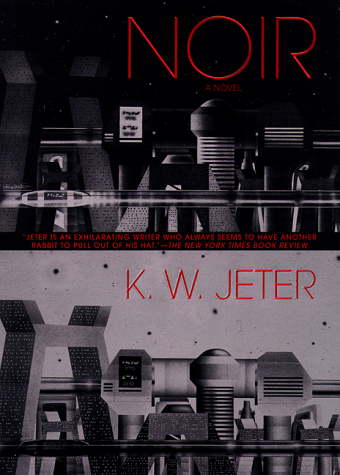September 02, 2005
Jeter's libidinal economics

A near-future world in which copyright violation is punishable by near-death? The premise upon which K W Jeter's novel Noir is based risks bathos and absurdity. As it happens, though, the sheer intensity of Jeter's detestation of copyright violators attains a certain sublimity, most notably when he describes the evisceration of a minor-level downloader. The kid has his spine and cortical matter removed and preserved to be later encased in speaker wire as a 'trophy', allowed just enough life to suffer indefinitely. As Steven Shaviro points out in Connected, or what it means to live in the network society (in which Jeter plays a central, if usually adversarial, role): 'What's remarkable about this section of Noir is not just the amazing conception of the punishment mechanism, a sadistic machine to rival the one described in Kafka's "In the Penal Colony." Even more startling is the gusto and gleeful exuberance of Jeter's prose as he describes the torture in loving, intricate detail, savouring it on page after page. Indeed this is the only place in this bleakly dystopian book that Jeter allows himself any sings of hope, satisfaction or pleasure.'
Jeter couldn't be more out of step with the cyber-Californian conviction that 'information wants to be free'. He sneers at such homilies, scorning them as 'a half-baked amalgam of late-Sixties summer of Love and Handouts, Diggerish free food in the Panhandle of Golden Gate Park, and Stalinist collectivization' . Jeter's hard-boiled prose radiates, in fact, a loathing for 'everything that flows', from the information networks that allow copyrighted material to be freely exchanged to the delocalizing and deterritorializing effects of global capital itself. This loathing reaches a delirial pitch in the climactic image of Noir, which sees downtown Seattle consumed by a fire-extinguishing nutrient gel. The gel contains the fire, but at the cost of de-individuating organisms, swallowing them into an orgiastic ocean in which the skin, the last boundary to 'ultimate connectivity' is sloughed off, and the obscenely replicating 'stuff of Life' is exposed in its true form(lessness).
It would be difficult to think of a more perfect image of what Baudrillard characterizes as 'the ‘proteinic’ era of networks, [...] the narcissistic and protean era of connections, contact, contiguity, feedback and generalized interface that goes with the universe of communication' than this seething slime. Not for nothing does Baudrillard describe the hyperconnected cybernetic system as obscene, and he would no doubt understand why, in the universe of Noir, the word 'connect' functions as a profanity, i.e. 'what the connect are you doing?', 'connect you, mother-connector'. In substituting 'connect' for 'fuck', Jeter forces us to reflect on what it is that made 'fuck' an obscenity in the first place. His implicit suggestion is that 'fuck' is a profanity because sex compromises the integrity of the organism, and such a compromise remains abominable, no matter how attractive it might also be.
The deadly lure of that which will erase all identity is of course the libidinal motor of Jeter's beloved film noir, at the heart of which is the sublime presence of the femme fatale, the Woman Thing. But the 'little death' that the sex-siren can offer is as nothing compared to the near-total annihilation of subjectivity promised by the connecting technologies of Jeter's twenty-first century. In Noir, it is as if the Thing - the primordial Real - can throw off its female avatar and emerge as a depersonalized, technological monstrosity.
'In Oedipus the King,' Alenka Zupancic writes, 'it is ... the Sphinx that plays the role of the femme fatale.' In Noir (and Oedipus Rex, as Zupancic observes, is the first Noir story), the femme fatale plays the role of the Sphinx. In Sophocles' play, the Sphinx is more than the harbinger of death: it is in the destroyer of the very possibility of identity, of individuality, itself. The plague that the Sphinx brings is the correlative of Oedipus's unwitting transgressions, because the destruction of his Father and the 'connnection' with his Mother threatens to return humanity to the condition of bacteria, which are indifferent to 'generational time' and therefore to organismic individuation. The Sphinx is what threatens to subsume humanity into what Anti-Oedipus calls 'the biocosmic memory that threatens to deluge all attempts at collectivity.'
In Noir, the Sphinx-figure borrows her most frequently-used name from the Aztec 'goddess of filthy things', Tlazolteol, and the novel's anti-hero, McNihil, encounters her via a kiss with an avatar who takes the femme fatale role of the 'ultimate barfly'. The 'ultimate barfly' is a Prowler, a human-simulator who roves the 'Wedge' (a delirial interzone somewhere between cyberspace and Leopold Bloom's Nighttown) to trawl for memories which she returns to her user via a flesh interface located in the tongue. McNihil describes her kiss as 'like a contact with a live battery'. Abandon all hope ye who enter here, Jeter warns, but he might as easily have written ye who enter her. McNihil's contact with the Tlazolteol-Thing is more than a brush with Death ('To have any encounter with Tlazolteol at all, to have seen her in my face the way you did and still be walking... you're a totally lucky bastard', the Prowler tells McNihil), it is indeed to travel 'beyond hope', to an 'End Zone' of pure fatality, the place that every letter is destined to reach, where those who 'have always been waiting for you' hang out.
'Different names, different forms. But always the Filth Deity - that's what the name means - the goddess of sexual impurity and deep, bad, annihilating sin. First a seductress, with no thought in her immaculate head other than connecting. Then comes her first destructive form, the one dedicated to gambling, risking and daring everything, including your own life. Then the redemptress, the form that can absorb and absolve human sin. That form can forgive sinners and remove all the world's corruption. It's not her last form. The last form is the hag with teeth of iron, the destroyer of pretty youths and all innocence. Like I said - everybody meets up with her eventually.'
You always know the Tlazolteol-Thing when you see her. Both she and the nutrient ocean-gel are images of a Deleuzoguattarian Capitalism that is, like the Sphinx, the 'condition of impossibility' for Oedipal subjectivity. For Deleuze-Guattari, Oedipus is simultaneously the denial and the expression of a Capitalism that, on the one hand, unpicks all identities, and on the other, is defined by its continual thwarting of final collapse into schizophrenia, Jeter's ultimate connectivity. Anti-Oedipus:
'And isn't that also what Oedipus, the fear of incest, is all about? If capitalism is the universal truth, it is so in the sense that makes the capitalism the negative of all social formations, it is the thing, the unnamable, the generalized decoding of all flows that reveals a contrario the secret of these formations, coding the flows, and even overcoding them, rather than letting anything escape coding.'
Intellectual property is at the bleeding edges of capitalism. At the same time as digital culture becomes increasingly difficult to protect, hitherto uncommodifiable entities - such as the genetic code of remote tribes - fall under corporate ownership. As Shaviro identifies, one benefit of Jeter's hardline stance on copyright is to make intellectual property not a technological, but a political and economic matter. Jeter, in fact, deals in libidinal economics, in the psychoanalytic dimensions of trade of every kind. Suffering, and the desire to cause suffering, are central to Jeter's theory of economics. Presenting a kind of Nietzschean Geneaology of Downloading, Jeter speculates that theft of intellectual property is more than a matter of saving money. Downloaders trade in copyright material because they resent creative people and want to destroy them. (They also hate themselves, since in an age of such draconian measures against copyright violation, to download is an act of self-destruction.) The desire to cause pain is present in owners as well as in those who steal, though. In his first sequel to Blade Runner, The Edge of the Human, Jeter solves one of the puzzles of the original film by explaining why the replicants were made increasingly sentient. As Tyrell's niece, Sarah, explains to Deckard:
'Why should the off-world colonists want troublesome, humanlike slaves rather than nice, efficient machines? It's simple. Machines don't suffer. They aren't capable of it. A machine doesn't know when it's being raped. There's no power relationship between you and a machine. ... For the replicant to suffer, to give its owners that whole master-slave energy, it has to have emotions. .... When Bryant was telling you about the Nexus-6 models, he was conning you and he knew it. The replicant's emotions aren't a design flaw. The Tyrell Corporation put them there. Because that's what our customers wanted.'

The exploitation which is ubiquitous in Jeter's world is not undertaken solely for the purpose of profit. On the contrary, money is acquired because it allows you to cause suffering with impunity (the ultra-rich are permitted to 'pre-register' the killing of homeless people, for example). Shaviro is right that the punishment for intellectual property violation in Noir combines 'the implacable severity of the categorical imperative' with 'the shattering intensity of the sublime' but Jeter's is an unremittingly vicious universe in which the presupposition that Kant's ethical system is based upon - the possibility of acting disinterestedly - is ruled out. The one moment of apparent friendship in the novel (McNihil's gift of the brain and spine of the downloader to the author whose copyrights he has violated), macabre enough in the first place, is quickly revealed to be a moment of weakness which allows him to be set up. Betrayal, as the author tells McNihil, is the essence of noir. (McNihil has optical surgery which converts the outside world into the stark monochrome world of the Noir films of the 1940s. His motivation is a puzzle throughout the novel: is it to escape modernity into a more rarefied, more beautiful world, or a a consant reminder of the world's total venality that is intended to keep him focused on the impossibility of redemption?)
But what of Jeter's own politics? A comparison of intellectual property with cattle running free in the days of the Old West is telling. Jeter is a conservative in the original American sense, committed to preserving his own liberty against the incursions of the State (which has all but collapsed in the world of Noir), big corporations and data pirates (the modern equivalent of cattle rustlers). The parallels of cyberpunk with noir are long established, but the connections with the mythology of the Old West are also instructive. Jeter's 'freelancers', like Gibson's 'data cowboys', are rugged individuals struggling on a New Frontier, this time technological rather than geographic. Although they are superficially similar, McNihil is the very opposite of Gibson's Case. Case makes his money by stealing intellectual property, McNihil by protecting it. Jeter may be hostile to multinational corporations - the real villain of the piece is the Sadean DynaZauber executive, Harrisch - but Jeter remains a purveyor of Capitalist Realism. His is a nostalgia for an earlier, almost primitive, form of capitalism. In a world in which collectivity is unthinkable, all that is left is the burnt-out case of libertarian 'autonomy'.